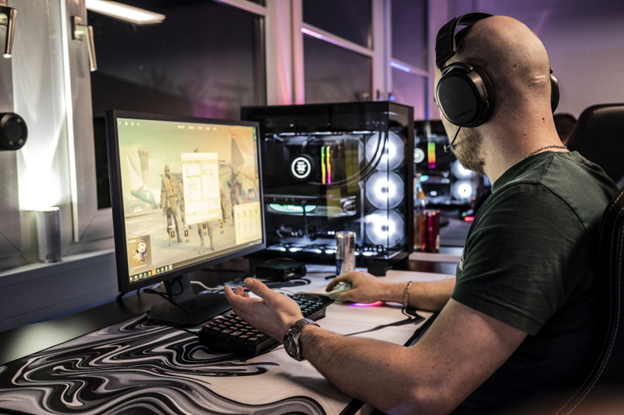
Jumping into online multiplayer games can feel overwhelming at first. The fast pace, experienced players, and complex mechanics often leave newcomers frustrated and ready to quit. By understanding common beginner mistakes and knowing how to avoid them, you can dramatically improve your gaming experience while protecting yourself from potential online risks.
Online multiplayer requires more than just good reflexes. Many new players forget basics like enabling privacy settings, using strong passwords, and being cautious about sharing personal information. Even seemingly friendly requests from other players could be attempts to compromise your account or personal data.
Smart gaming habits make all the difference in multiplayer environments. Playing during off-peak hours when fewer experienced players are online gives you space to learn. Limiting your sessions prevents burnout and frustration that comes from extended play. Remember that everyone starts somewhere—the players dominating the leaderboards were once beginners too.
Understanding the Basics of Online Gaming
Before diving into multiplayer games, let your premier gaming solutions provider guide you through the fundamentals. The online gaming world has its own culture, language, and unwritten rules that can make or break your experience.
Multiplayer Game Genres
Online games come in several distinct categories, each with unique gameplay styles. First-person shooters (FPS) like Call of Duty focus on combat from a first-person perspective, testing your reflexes and aim. These games often involve team-based objectives or free-for-all battles.
MOBAs (Multiplayer Online Battle Arenas) such as League of Legends require strategic thinking and team coordination. You'll control a single character with unique abilities in team fights.
- TikTok used for disinformation campaign in Taiwan
- How to avoid common newbie mistakes in online multiplayer games
Keep Reading
RPGs (Role-Playing Games) like World of Warcraft let you develop a character over time. You'll complete quests, gain experience, and often cooperate with other players.
Battle Royales combine survival elements with last-man-standing gameplay. Think Fortnite or PUBG where you scavenge for weapons while the playable area shrinks.
Common Terminologies
Gaming has its own language, and learning it is crucial for effective communication:
- AFK: "Away From Keyboard" - when a player isn't actively playing
- Bot: Either AI-controlled characters or an inexperienced player
- Loot: Items or rewards collected during gameplay
- Buff/Nerf: When developers strengthen or weaken game elements
- Ping: Your connection speed (lower is better)
- Camping: Staying in one spot to ambush others (often frowned upon)
Map knowledge is also essential - veterans know every corner, spawn point, and strategic position. Don't feel overwhelmed; everyone starts somewhere.
Online Gaming Etiquette
Proper behavior makes gaming better for everyone. Toxic behavior like verbal abuse, intentional team-killing, or rage-quitting ruins the experience and can get you banned.
Most communities have specific rules. Learn them. Use voice chat appropriately - keep background noise minimal and communicate clearly but don't spam callouts.
Be a team player. In team-based games, cooperation trumps individual glory. Share resources when appropriate and play your role effectively.
Accept defeat gracefully. Everyone loses sometimes - it's how you improve. Watch how better players handle situations instead of blaming teammates.
Respect other players' time. Going AFK during matches leaves your team shorthanded. If you need to step away, communicate this before the match starts.
Staying Safe and Secure While Gaming
The internet can be a wild place, especially in online gaming. Protecting yourself from threats isn't just smart - it's essential.
Account Security
Strong passwords are your first line of defense. Create unique combinations with at least 12 characters including numbers, symbols, and mixed cases. Never recycle passwords across different games.
Enable multi-factor authentication whenever possible. This adds an extra security layer that hackers can't easily bypass. Even if someone gets your password, they'll need your phone or email to get in.
Consider using a password manager to keep track of all your gaming credentials. These tools generate and store complex passwords so you don't have to remember them.
Always log out of your accounts when using shared computers. Public gaming cafés are hotspots for account theft. And update your gaming clients regularly - developers patch security holes with each update.
Protecting Personal Information
Be careful about what you share in game chats. Your real name, address, school, or workplace should stay private. Even seemingly innocent details can be used to build a profile about you.
Configure privacy settings on all gaming platforms. Most games let you control who sees your profile and who can contact you. Take time to review these settings when you first set up an account.
Watch out for phishing attempts. Legitimate gaming companies will never ask for your password through email or chat. Be suspicious of links promising free in-game items or currency.
Use a VPN when gaming to mask your IP address. This prevents others from tracking your location or potentially launching attacks against your network.
Awareness of In-Game Transactions
Free-to-play games make money through in-game purchases. Before buying, understand exactly what you're getting and whether it's worth the cost.
Set spending limits for yourself. Game design often uses psychological tricks to encourage impulse buying of loot boxes or cosmetic items. Decide on a monthly budget and stick to it.
Keep your payment information secure. Don't save credit card details in gaming platforms if you can avoid it. Use prepaid game cards as a safer alternative.
Check your transaction history regularly for unauthorized charges. Enable purchase notifications so you're alerted whenever money leaves your account.
Be wary of "deals" that seem too good to be true. Third-party sites selling game currency or items at steep discounts are often scams that can result in account bans.
Improving Your Gameplay Experience
Getting better at online multiplayer games takes more than just playing for hours. It's about learning the right way, using smart strategies, and connecting with others who share your passion.
Learning Game Mechanics
You need to understand how your game works at its core. Take time to learn the controls until they become second nature. Many games offer tutorial modes - use them.
Don't skip reading patch notes when games update. These changes can completely shift how characters or weapons perform.
For complex games like League of Legends, study one role deeply before branching out. Watch tutorial videos on YouTube or Twitch. The pros break down advanced mechanics in ways the game itself never explains.
Practice specific skills in custom games or training modes. Work on your aim, timing, or resource management in a pressure-free environment.
Remember: mechanics are the foundation everything else builds upon. Master them first.
Effective Strategies for Progression
Set clear goals for each gaming session. Want to improve your K/D ratio? Focus on positioning and taking smart fights. Need more experience points? Prioritize objective-based gameplay.
Track your progress with screenshots or notes. What works? What doesn't? Data doesn't lie.
Understand the progression system in your game. Some reward daily play with bonuses. Others require completing specific challenges. Align your playtime with these systems.
Take breaks between matches to analyze what happened. Did you make the right decisions? Could you have positioned better?
Build a versatile skill set rather than relying on one strategy. Games evolve, and one-trick players often struggle when patches change their favorite approach.
Joining Gaming Communities
Connect with other players through Discord servers dedicated to your game. Veterans often share valuable tips you won't find elsewhere.
Reddit communities offer strategy guides and discussion forums where you can ask questions. Don't be shy - most gamers enjoy helping newcomers improve.
Find a regular gaming group at your skill level. Growing together creates accountability and shared knowledge.
Follow community rules when interacting with others. Toxic behavior ruins the experience for everyone and can get you banned.
Consider joining a clan or guild that matches your playstyle. These organizations often have training sessions and internal tournaments to help members improve.
Remember that social connections make online gaming more enjoyable and sustainable. Games come and go, but friendships can last much longer.
Avoiding Unfair Play and Cheating
Let's face it - cheaters ruin the experience for everyone. When you're starting out in multiplayer games, you need to know how to play fair and recognize when others aren't.
What counts as cheating? Using third-party software, exploiting glitches, or having other processes modify the game. These give unfair advantages and can get you banned.
Game developers are constantly fighting against cheaters. They implement security measures like anti-cheat software and server-side verification to catch those breaking the rules.
Want to stay on the right side? Here's how:
- Report suspicious players when you see unusual behavior
- Never download unofficial "helper" programs
- Avoid forums that promote exploits or hacks
- Play on official servers with active moderation
Remember that most games track your behavior patterns. Sudden improvements in accuracy or impossible reaction times will trigger their systems.
The best multiplayer experiences happen when everyone plays by the same rules. You'll actually improve faster by facing legitimate challenges rather than looking for shortcuts.
If you witness cheating, document it with screenshots or recordings before reporting. This helps developers take appropriate action and issue bans to keep the community healthy.










